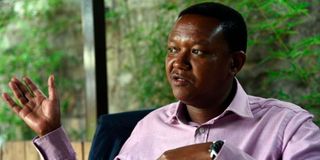
Machakos Governor Alfred Mutua and his estranged wife Lillian Nganga during a past event.
| File | Nation Media GroupNews
Premium
Alfred Mutua: Lilian, I and the politics of our times
What you need to know:
- Every day has been special for us and I treasure the memories we have made together.
- Different people are going through different challenges in their relationships, and mine and Lillian’s was not different.
I remember when and where I met Lillian. It was inside an aeroplane many years ago. And it was love at first sight for both of us. We just connected and went on to share great moments for years. Every day has been special for us and I treasure the memories we have made together.
So, if we were this good together, why did we part ways two weeks ago? The answer is simple: different people are going through different challenges in their relationships, and mine and Lillian’s was not different. The only difference was that we were bold enough to go public about ours.
You see, you are not there when when two people meet and neither are you when they decide to stay together or go separate ways. So, for Lillian and I, what people think or say means nothing. We are the ones who found each other, the ones who know where we are with each other, and the ones who know what we want with our lives.
Yes, I know that sounds like a contradiction in terms as we made our relationship — and its end — public, but we needed to let people know that we had decided to go our separate ways because our lives had been very public. Relationships are very fluid. They are like politics; today you are here and tomorrow you are there. But they are still personal.

Machakos County Governor Alfred Mutua (right) with his estranged wife Lilian Nganga during the Cultural and Culinary Journey at India House in Muthaiga on May 11, 2019.
Because of our times together, I respect Lillian and will not talk ill of her or derogate her. This is somebody who has given me her life, so I’ll concentrate on the good times and not the bad. That makes us more civil and leaves room even for more interactions, either with yourselves or future partners.
When things went haywire and Kenyans started following our every move I told Lillian that we had just become the royal family of Kenya. There were concerns about what would happen to the name of the hotel we built together, and which we named A&L Hotel (Alfred & Lillian Hotel). But why would I change the name now? This is still our hotel. It is our baby. When parents divorce, do they deny their babies the right to use the names on the birth certificates?
I think the most important thing is that Lillian and I are friends, very good friends, and that friendship is based on love. When you love somebody and they know it, the love never goes away. You always have to leave room for the future. You can come back together, and even if you don’t and you go separate ways you are at peace.
That’s why I invited her for my 51st birthday at Ole Sereni Hotel in Nairobi. And, by the way, she wouldn’t have missed it. The birthday party had actually been her idea as I have never had one. It was my first birthday party ever. I grew up very poor and I think I have had cake… may be twice, one from my mum and the other from Lillian.
So, while her appearance at the party got people thinking that we were faking our break-up, we weren’t. We are living our lives. Now, I have been asked whether people should expect another First Lady for Machakos before my term ends. My answer is simple: Moi ruled this country for 24 years without a First Lady.
But time will tell.

Machakos County Governor Alfred Mutua (left) and his estranged wife Lilian Nganga during County First Ladies Association's Strategic Plan: 2015-2020 meeting at Safari Park Hotel on July 31, 2015.
That said, I am a man who believes in the mantra of “one woman at a time”. Maybe it is my Christian ideology, but for me it has always been one woman at a time. Have your woman and love her, and if you want someone else, leave her and go have that somebody else. Don’t have your wife and then have two or three concubines taking money and spreading diseases.
Traditionally, polygamy was in order. It had its place in society. There was a support system and it worked because the first wife would identify the second wife and even bring her home. She would okay the marriage of the second and third wife. It was a functional family, and also very structured.
Proximity to power
Some people think that, since politics in Africa is always played around family, my separation with Lillian will affect my political career. That thinking has no basis at all. Who knew Margaret Kenyatta before Uhuru became president? When you went to vote for Uhuru, did you do so because he had a wife called Margaret?
Away from Lillian and I, I have learnt many lessons in life. I, for instance, joined the Kibaki administration after being hired competitively as Government Spokesman. The government wanted to streamline communication after the Anglo-leasing debacle where ministers were speaking at cross-purpose. The position gave me the limelight, and with it came a lot of envy, which is natural. Here I am; 33, baby-faced and all of a sudden on TV every day yet there are senior politicians and permanent secretaries without that clout. There was a bit of unease.
The people who helped me settle in were the then Head of Civil Service Francis Muthaura, NIS boss Wilson Boinnet and his successor Michael Gichangi. They understood the dynamics and knew that I meant well. Boinnet took me to NIS headquarters in Ruaraka and told me that people were envious of my appointment and so I needed to protect myself, and that the only way to do so was to be seen hanging around the centre of power. He told me that I needed to spend my time hanging around in State House. I asked him if that meant meeting the President on a daily basis and he said no, just hanging around.
He gave me the example of Mark Too during President Daniel arap Moi’s tenure. Mark would go to see Boinnet in the morning (Boinnet was then Moi’s aide de camp), get the day’s newspapers then sit in the lounge for hours. All visitors coming to State House would find him there, and they would leave him at State House when leaving. Somehow, they started believing that Mark Too was very close to the President.
“Hyslop Ipu (then State House Comptroller) is your friend,” he told me. “Spend time with him every day. All it takes is to be seen there. Let ministers coming to State House find you here, let the gardeners say Mutua was here for these number of hours before he went to give his routine addresses.”

Machakos Governor Alfred Mutua talks to the ‘Sunday Nation’ in Nairobi on August 24, 2021.
In the end, I started riding in the same car with Muthaura when he was going to see the President and remained at Hyslop’s office as Muthaura went in to see the President. The proximity to power worked for me as my stature and influence grew.
Muthaura is a gentle soul. He was like my father and I spent a lot of time with him. He is extremely intelligent but remains humble. He has foresight. We sat with him one day to watch Uhuru on TV. Uhuru was then the Minister for Local Government. Muthaura listened to him then turned and told me: “This young man will be president one day.”
On another occasion, during the burial of Pope John Paul II, Muthaura observed the mannerisms of Cardinal Joseph Ratzinger of Germany and the role he was playing, and he told me the prelate was in a pole position to become the next Pope. He ended up as Pope Benedict XVI. He could see the machinations.
Muthaura is also extremely ethical and incorruptible. He loves this country and lives within his means. But the greatest thing about him was fairness. He would argue that even when people pile pressure on you to fire a staff member, you need to give it deep thought. The person has dependents, he would say. He or she has children in school, a wife or husband and perhaps a sick relative they are taking care of. You can’t just fire them at a whim. That’s Muthaura for you.
Tensions in the Raila camp
During my tenure as government spokesman many people in the Raila camp of the coalition government didn’t like me. They said I was being used by the Kibaki side to cast the ODM leader in bad light. That, though, was not the case.
It is true that during the coalition government I was on Kibaki’s side, but when I criticised Raila I did so with decorum. We attacked Raila, but it was not personal. It was professional. That, perhaps, explains why Raila is fond of me even to date. He knows I’m a person of principle.
Many people from the Kibaki side used to go and see the Prime Minister at night for what they call “dual loyalties”. Raila knew without a shade of a doubt where Mutua stood — with Kibaki.
The thing about Raila is that he is a powerful man who doesn’t push his power. He is very powerful, but when you sit down to talk to him, you realise he is not arrogant. I tell people Raila talks to a person who cleans toilets the same way he talks to the President; with the same sense of decorum and respect.
Cobra Squad steeled me
Before I joined government I had dabbled in a few other things, including academia and film production. When I was a student in the US I produced a film titled An African in America. Then I went to Australia and was hired as a foreign correspondent as a result of a documentary I did on Kenya to Harare by road and the role of propaganda in leadership and communication.
I started touring the world and went to Australia Film School where we learnt the basics of camerawork. I have always been a person who likes efficiency and not confusion. I like things being done well and promptly, hence the Chap Chap ideology.
When I was in Dubai I did a documentary called In the Desert, and when I came back home I revived a company I had registered when I was 19 called Golden Dreams, which at that time had been publishing a newsletter for sale at Reinhardt Bonnke crusades. I shot a pilot for the crime series Cobra Squad and took it to different corporations, including Airtel and Nakumatt, and I managed to raise Sh25 million.
People used to laugh at Cobra Squad but I made a lot of money from it. I bought my first house in Nairobi with money from the series. So I let people talk and ridicule me while I laughed all the way to the bank.
And then, even as I did all this, I saw an opportunity in politics. When the new Constitution was being drafted we in senior government positions held a meeting in Mombasa to go through the proposals. I sat next to General Gichangi and I think then Attorney-General Amos Wako, now Busia Senator. I looked at the draft and it occurred to me that the next most powerful position in this country after the Presidency was going to be the governor, and I decided I would view for governorship.
Most people who went for the Senate seat today want to become governors. They did not understand what they were doing. I remember a senior government official wondering why I was going for governor. To him that position was like a mayor in a different clothing. I knew he had not read the Constitution properly, and if he had, he hadn’t internalised it. Today, he knows better.
I resigned and went to brief President Kibaki about my running for governor. He was very happy. He stood up and gave me a hug. He then told me to see him the next day. After we finished our meeting at Harambee House the next day, he called me and he gave me a briefcase full of money.
“Huu ni mchango wangu na Lucy. Enda ukakalishe wazee chini muongee upange siasa,” he told me. That’s how my first contribution for governor came from Mwai Kibaki. I will not say how much it was, but it was in the millions.
A few days later my campaign offices were broken into and I remember losing about Sh10 million that I had raised for the last push. I couldn’t even afford to pay the agents but since then Tanzanian President Jakaya Kikwete had become my friend, I called and told him about my predicament. He asked me to go to Dar es Salaam.
Around the same time he was renaming Bagamoyo Road to Mwai Kibaki Road. Lillian came along with me for the meeting. Later that day he got someone to send me Sh10 million in US dollars to help me with the last push of campaigns. I don’t think I would have managed to pay agents and win were it not for that money from President Kikwete.
Now, looking back at the two terms of my governorship, I’m very happy with my track record. The first 10 years of devolution have been very difficult but I feel that I have been able to achieve more than my colleagues because of the philosophy of Maendeleo Chap Chap.
I have focused on the basics of survival like provision of water, roads, good health care and other things. I have ambulances in nearly every village. I have also brought down crime by installing solar lighting in every village and bought cars and built homes for the police.
You can’t say you are going to provide jobs when you do not have infrastructure, so we provided water, built roads and embarked on a number of industrialisation initiatives. When I built that park and the stadium, people criticised it as a misplaced priority, but now, as a result of that people are coming to Machakos and shops have grown around the park, and that is how you grow an economy.
The Formula 1 track I promised but couldn’t deliver was part of the bigger plan of a bigger city. It was an example of how a city should look like. I was saying what can be done in the West it can also be done here.
We signed memoranda of understanding worth Sh2.1 trillion, bigger than the budget of this country, but Wiper Party, using the then Senator Johnson Muthama, went to court and got an injunction stopping any land being allocated to investors. We stayed in court for about six years. We couldn’t move because of petty politics.






